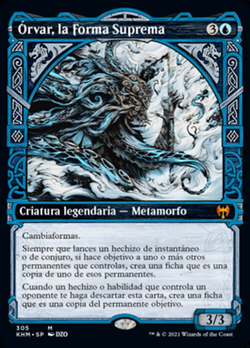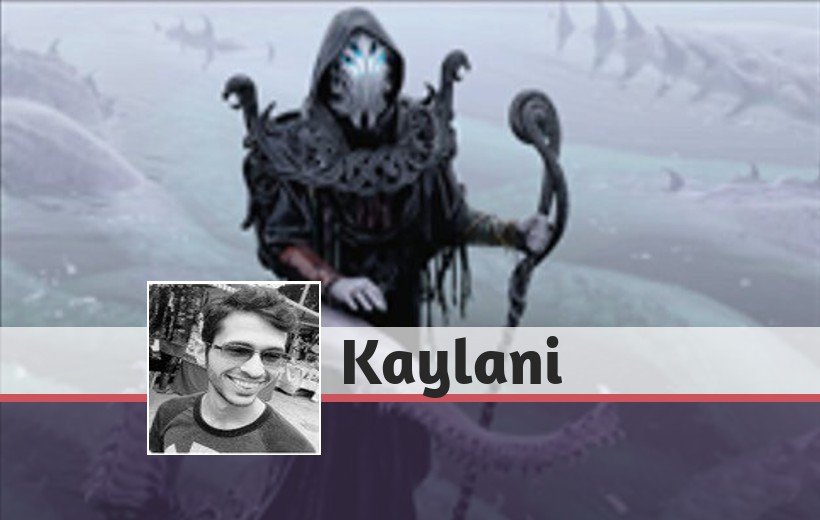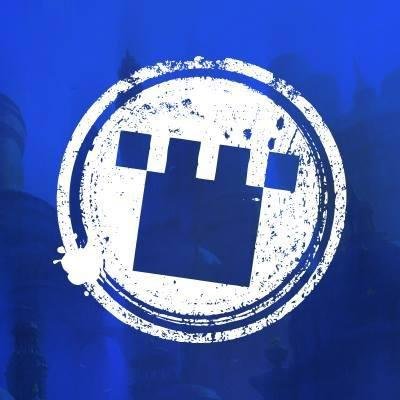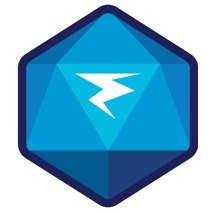Hello!
We are back with the second article of the "B-Sides of the cEDH" series, where we'll analyze off-meta decklists built towards competitive commander tables. In the last article, we talked about the most relevant decks in the current cEDH metagame and today we'll talk about Orvar, the All-Form, a list which is courtesy from the player Luis Eduardo Nunes.
Orvar, the All-Form
Commander, Kaylani

45 commons, 14 uncommons, 35 rares y 6 mythics

1
Santuario místico
4.96
1
Vista prismática
122.83
1
Coliseo cefálido
0.58
1
Tumba antigua
381.18
17
Isla cubierta de nieve
79.34
1
Caverna de ánimas
151.67
1
Delta contaminado
53.74
1
Feria de Inventores
50.63
1
Playa anegada
40.67
1
Cavernas de gemas
181.67
1
Bosque tropical brumoso
92.86
1
Laguna ardiente
89.31
1
Nube de hadas
0.5


1
Draco dorado
723.75


1
Maga etérea vedalken
2.14


1
Rompecascos
11.1


1
Buscahechizos
43.29


1
Arqueomante
0.78



1
Narset, parter de velos
3.59



1
Teferi, Maestro del Tiempo
43.39



1
Loto enjoyado
122.31

1
Cromo Mox
354.63

1
Pétalo de loto
86.82

1
Cripta de maná
245.62

1
Diamante mox
2895.12

1
Ópalo mox
524.09

1
Anillo solar
3.4

1
Cofre de maná
255.79

1
Candelabro de Tawnos
5428.39

1
Sello arcano
1.19

1
Monolito siniestro
1302.78

1
Tótem maldito
4.91

1
Medallón de zafiros
13.68

1
Piedra de Fellwar
2.06

1
Joya codiciada
0.58

1
Rémora mística
29.92

1
Copiar Artefacto
202.25


1
Estudio rístico
193.65


1
Traición
144.72



1
Reflexionar
4.63

1
Doctorado de rasgos
1.77

1
Sonda gitáxica
19.87

1
Final del Apocalipsis
0.65



1
Transmutar artefacto
1447.54


1
Cuerdas ocultas
1.26


1
Pergamino de comerciante
50.63


1
Resolver la ecuación
6.77


1
Timetwister
3404.38


1
Ganancia inesperada
10.03


1
Espiral del tiempo
470.43



1
Restauración de Portal Marino
124.74




1
Pacto de negación
54.35

1
Hechizo fallido
3.94

1
Tormenta azoradora
24.4

1
hidroblasto
16.25

1
Marea alta
4.45

1
Capricho de Volrath
43.39

1
Girar
1.25

1
Tutora mística
36.77

1
Inspiración súbita
4.58

1
Cadena de vapor
36.15

1
Flujo de esencia
0.94

1
Canción del cisne
38.11

1
Horadar el hechizo
0.47

1
Agarre del sueño
1.26

1
Hechizo mareado
2.86

1
Reloj giratorio
0.61

1
Tropiezo mental
30.42

1
Grieta ciclónica
117.83


1
Quebrar
5.89


1
Drenaje de maná
123.38


1
Reversión dramática
5.39


1
Retrasar
6.65


1
Enturbiar la mezcla
6.33


1
Tomar del mañana
0.61



1
Espasmo de la realidad
4.67



1
Custodia feroz
148.74


1
Fuerza de la negación
185.33



1
Fluctuación fantasmal
2.49


1
Cenit del sol azul
10.82




1
Descaminar
19



1
Fuerza de voluntad
185.65



1
Hurgar en el tiempo
0.94



99 cartas maindeck

Lista de niveles
Sin rango
Califícalo tú mismo
*Este sitio contiene enlaces de afiliados por los cuales podemos recibir una compensación.
Orvar, the All-Form is a great commander to lead a Frog tribal, but let's look at his abilities which makes him a viable option on cEDH. "Whenever you cast an instant or sorcery spell, if it targets one or more other permanents you control, create a token that’s a copy of one of those permanents." The idea here is clear, use cheap spells that target permanents that you control to create copies and storm to win the game.
"When a spell or ability an opponent controls causes you to discard this card, create a token that’s a copy of target permanent." it is a bonus, but taking advantage of this ability does not happen often, since it is necessary to have a wheel in the stack (super common) and Orvar in hand (much less common).
This Commander being of all types is surprisingly useful since the deck can run Cavern of Souls without pushing too much its monoblue mana base.
Ad
Gameplan
Following the tradition of pure blue decks at competitive Commander, Orvar operates as a control deck most of the time. However it pivots well to storm, so we are talking about an adaptive deck.
The commander's static ability is used in conjunction with other blue staples to establish card advantage. After a few leaps and bounds in the early game, the mid to late game consists of establishing some infinite mana combo and using an outlet to close the game. The deck does not have such simple lines that they offend the pilot but instead uses several interchangeable effects to assemble a combo in an extremely adaptive way.
The Deck's Highlights
To highlight what attracts a veteran player to the deck, I "interviewed" an Orvar player to find out why the person is not driving Silas-Roger or Tymna-Kraum on this meta. I also asked about this commander's particular spice :
"Orvar is an adaptive deck that wants to control the game and establish advantage on cards or permanents using Orvar in the early game, to transition to a robust win in mid-game. The game plan involves generating infinite mana with any of the combos present in the deck and sinks the mana in a draw outlet, first so you can draw your entire deck, then your opponents die from overdrawing. The combo lines are many, and as the deck, they are extremely adaptive, changing dramatically with your board state and with your hand. I particularly liked Orvar because it offers a viable game plan in an unprecedented way. Of course, I'm not talking about winning with High Tide, this has been used for millennia, but how we arrive at it is very interesting and new. The deck uses very obscure cards and has very dense strategies, which, by itself, already makes the interaction with him hell. Add that to the fact that Orvar’s ability makes all interactions extremely awkward and you have a surprising resilience in mono U, which does not usually protect permanents."
Combos

Ad
Initial condition: Treachery and Orvar in play, Whim of Volrath in hand, four lands in play
- Cast Whim with Buyback targeting Treachery.
- Orvar triggers, copying Treachery.
- Treachery triggers, untap four or more lands.
Repeating the first step with Whim+Buyback costing 3 mana, we can make infinite mana. Then we need an outlet like Finale of Revelation or a tutor for an outlet like Spellseeker.
Notice that some card advantage engines such as Mystic Remora and Rhystic Study work as outlets for Orvar since after the combo is assembled we can use Whim to make an arbitrary amount of copies of those enchantments and when the opponent casts a spell, we can draw our entire deck.
Ad
Another combo.
Initial Condition: Orvar in play, Spellseeker in hand and 6 mana available.
- Cast Spellseeker. Search for Essence Flux.
- Cast Essence Flux, targeting Spellseeker. Orvar triggers and creatures a copy of Spellseeker, search for High Tide no ETB.
- Essence Flux resolves, exiling, and returning the original Spellseeker. Search for Hidden Strings no ETB.
- Cast High Tide.
- Cast Hidden Strings, targeting Spellseeker and an Island. Orvar triggers and creates another copy of Spellseeker. Search for Snap. Untap your Island.
- Cipher Hidden Strings on Orvar, move to combat and attack with him, cast a copy of Hidden Strings with the Cipher trigger The targets are the same as the last step. Search for Muddle the Mixture and untap an Island.
- Cast Snap-on Spellseeker with one of the untapped Islands. Orvar triggers and creates yet another copy of Spellseeker, search for Whim of Volrath. Spellseeker goes back to your hand, untap two islands.
- Activate Transmute from Muddle the Mixture tapping two Islands, search for Cloud of Faeries.
- Cast Cloud of Faeries tapping the remaining Island. Untap two Islands
- Cast Whim of Volrath with buyback tapping one Island, target Could of Faeries and, from now on, you'll be spending 2U to cast Whim of Volrath and adding UUUU with Faerie's ETB Trigger. You can generate infinite mana.
- With infinite mana, cast Spellseeker and target her with Whim of Volrath to have all the CMC 2 or less instants and sorceries on your hand,
- Cast Finale of Revelation to draw your deck deck.
- Cast Blue Sun's Zenith to 101 targeting an opponent. He loses, Zenith is shuffled back and is the only card on your library.
- Cast Ponder to draw BSZ and repeat the process
- Cast any cantrip to repeat the process for as many opponents as you have.
Ad
Ad
Did you find the combo convoluted or confusing? I agree. You want to play with the deck, right? The good news here that the pieces used in the combo would either be used in any way or have the advantage of being useful for other interactions, whether combining or interacting / tutoring.
Let's go into another one:
Initial Condition: Orvar in play, Coveted Jewel in play, and Whim of Volrath in hand.
- Cast Whim+buyback targeting Jewel. Orvar triggers, draw three cards.
- Use the Jewel's copy to repeat the process.
Ad
Plain and simple. Doesn't generate infinite mana, but draw your entire deck. It can also be assembled with Spellseeker in hand:
Initial condition: Orvar and an artifact in play.
- Cast Spellseeker. Search for Essence Flux.
- Castassence Flux on Spellseeker, Orvar triggers, search for Transmute Artifact with the copy.
- Essence Flux resolves, exiling and returning the original Spellseeker. Search for Whim of Volrath
- Cast Transmute Artifact, sac any artifact and search for Coveted Jewel.
- Cast Whim of Volrath with Buyback on Coveted Jewel, using Coveted Jewel's mana.
Ad
Rest of the Deck
As we are in mono-blue we will find the usual cards of control decks. Nothing worth mentioning that it was not mentioned to perform some of the combos with Orvar.
Unlike Pako and Haldan that we studied before, here it doesn't make much sense to analyze the deck in terms of packages. The spice of the deck is in the cards that only play here and in how the combos are complicated to decorate , but not to execute.
Final Considerations
Weaknesses
Ad
The deck is entirely dependent on the commander! Having the commander removed or countered is troublesome and that's where the quick metagame helps us: there are more urgent threats at the table. The deck also uses Whim of Volrath in various combos, losing it is a little bit annoying. We can use Clockspinning as a substitute, but we need a Sapphire Medallion to offset the additional cost.
Strengths
The deck is fringe. Even experienced players may find it difficult to interact at the right time. Everyone knows the time to launch their counter in Oracle + Consultation, depending on the type of counter, open mana, decks on the table, priority, and all possible permutations. With Orvar, those "oh crap" moments happen much more often, where the ideal moment to interact has passed or has not yet arrived. This allows the deck pilot, instead of trying to go over the top (like a stax) or underneath (like a turbo), to pass through the middle of the other decks on the table.
This ends the second article of the series, soon we will come back with another deck for you who got tired of piloting the usual decks of cEDH.








 Ebay.com
Ebay.com  Cardkingdom
Cardkingdom  TCG Player
TCG Player 





— Comentarios
0Se el primero en comentar